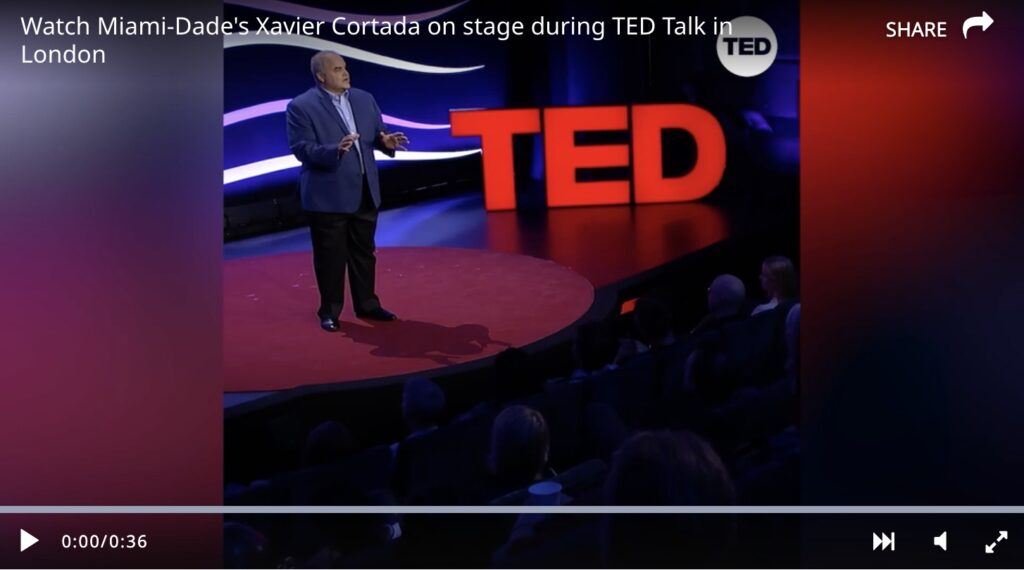Miami-Dade’s Xavier Cortada delivers a TED Talk about the power of art to combat the effects of climate change. BY TED.COM
Art can engage, educate and mobilize communities to fight climate change
MIAMI HERALD | December 15, 2022
XAVIER CORTADA
We are standing at the precipice of a climate catastrophe. Thanks to our insatiable addiction to fossil fuels, the planet is getting warmer, glaciers are melting and oceans are rising. And Miami is Ground Zero. This is all anyone here should be talking about, but our red-hot real-estate market has us focused elsewhere.
Signs are plastered across front lawns. “SOLD” in red-block letters announces the arrival of the newest iteration of Miamians. In a terrain of escalating property values, unbridled growth and conspicuous consumption, many new neighbors are clueless about the danger posed by our changing climate. It seems as if rising property values are making us all forget just how threatened those very properties are by rising seas.
As Miami mints a new skyline and propels rents to unaffordable heights, we may also be forgetting about the Miami we are leaving behind. New high-rise buildings have some units that sit empty, waiting for that two-week period when their vacationing masters get to call them home. Other units house a speculator’s dreams, shelter a foreign investor’s risk or provide a place that new arrivals can call their own. Comfortable with the cost of their new digs in this city of excess, the next generation of Miamians build anew as they erase what was.
They’re having fun. Surrounded by wealth, growth and promise, they feel like they are in control. But I worry about them. Unlike those who came before, these new residents will confront an existential crisis: The water will rise, and it will not recede. Miami — physical Miami, ecological Miami, vibrant Miami — is not eternal. They need to understand this reality, this vulnerability, in order to navigate the challenges the future will bring.
How fun will it be for them in 2050, when the number of extremely hot days in Miami is projected to increase fivefold? How fun will it be for Miamians in 2100, when the oceans are projected to drown huge swaths of the western part of the county, its coastline and its barrier islands?
It’s already no fun for many Miamians of today — specifically, those who find that their city no longer is affordable. They work several jobs to make ends meet. Finding more affordable housing further west or further south, they endure long commutes to work in the gentrified places where they were once raised. Miami is slipping away from them. Eventually, the squeeze of Miami’s growth will evict them long before the rising seas force them to leave.
Their individual loss contributes to our collective suffering. Their departure makes our city less livable, less resilient. It is in everyone’s interest to protect the interests of those most vulnerable among us. It’s not that Miami is losing its workforce, it’s that we are losing our soul, our community. Our love for one another.
In many ways, sooner or later, I see Miami slipping away from all of us. Who are we as a people when we do little to care about the communities and people we displace? Who are we as a people when we do little to protect those who will take our place in the future when we are gone?
What can we do as a people to build a more resilient and loving Miami? How can we rally Miamians — recent, established and native — so that we can learn together, work together and plan for a future where nobody gets left behind, especially as we confront sea level rise, extreme heat, and stronger storms?
As I explained during a TED Talk in London recently, I believe that socially engaged art can play a considerable role in bringing us together to solve this challenge. That is why I developed “The Underwater” project, where I worked with friends and neighbors to create a city-wide art installation that revealed our collective vulnerability to rising seas. Using an app, participants found their property’s elevation above sea level and depicted it on yard signs that would pique the curiosity of passersby, spark discussions and catalyze climate action.
This process of discovery, conversation and ultimately mobilization is something that can be replicated in any coastal community to give people a sense of agency and hope in a world that feels so out of control. I invite you to bring “The Underwater” project to where you live. Download the PDF at cortada.com/ted-talk-participate for instructions on how you can use art to help engage other Miamians in finding the equitable solutions we so desperately need.
Xavier Cortada is an artist and University of Miami professor of practice. He is the inaugural artist-in-residence for Miami-Dade County.

See original article at https://www.miamiherald.com/opinion/op-ed/article270045727.html

